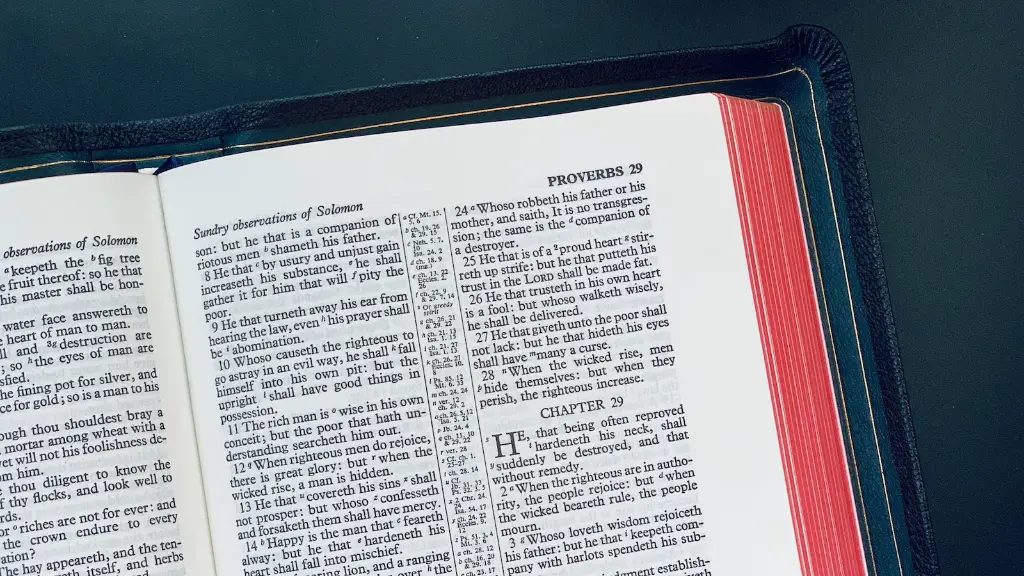Heresy In The Bible
Heresy is an opinion or belief that is at odds with the accepted doctrines of religious and spiritual beliefs. In the Bible, heresy is sometimes used to describe a person’s disbelief in the Gospel, or a doctrine that is against the main teachings of scripture. Heresy can also refer to a person’s rejection of God’s authority, which is considered a sin against God. While there are many types of heresy in the Bible, some of the most common ones are those that fall into the category of false prophets.
False prophets were individuals who confronted the people of Israel with teachings that contradicted God’s revealed law and prophecies. False prophets often lured people away from true faith and righteous living imposing their own ideas and visions on the people deceptively. Heresy was also a way to gain power and influence among the people in the ancient world. Throughout the Bible, God warns against such individuals and their teachings that was not in accordance with his Word, and he also plainly states the penalty for these false prophets.
The Bible does not give an explicit definition of heresy. Heresy is often looked at as a religious offence against the accepted tenets of Christianity; however, there have been several opinions on its comprehensiveness throughout the ages. It has been argued that heresy is a more restricted term, referring to those sorts of beliefs which go against the truth of the Christian faith and are deliberately aimed to do so. Those committing Holocaust or genocide, for example, would not likely be viewed as committing heresy.
In the Bible, however, there are numerous examples of condemned beliefs in the discussion of heresy. One example can be found in the book of Philippians 2:15, where Paul writes that a doing something that is not in line with Christ-like behaviour is classified as heresy. The Bible also tells us that when a person teaches something contrary to the Gospel, he or she is attempting to lead the people away from the truth of God’s word. As a result, these teachings and any individual who believes and practices them can be classified as heresy.
The punishment for heresy and those who practice it was quite severe in the Bible. In the Old Testament, for example, the death penalty was used for those convicted of heresy. In the New Testament, those convicted of this charge could be exiled from the Christian communities, as seen throughout the Book of Revelation. In the ancient world, heresy was seen as a serious spiritual offence and often could lead to severe social or even physical penalties.
Ultimately, it is important to remember that the Bible is the Word of God, and those who willingly choose to deny the truth of its teachings are acting in disobedience and rebellion. Heresy has been used in the Bible to describe this type of transgression against God, and it is an offence that should not be taken lightly.
The Nature of Heresy
Heresy can refer to any opinion or belief which is contrary to the Holy Scriptures and it still has major consequences. Heresy can often be perceived as the antithesis of orthodoxy. In general, orthodoxy is the set of beliefs which are consistent with the beliefs found in the Bible and can therefore be considered to be a subset of Christianity. On the other hand, heresy is a subversion of these common beliefs, again as found in the Bible. The issue of heresy has plagued the Christian Church throughout its history, as it has threatened to corrode its religious tenets.
The main problem with heresy is that it does not require an individual to reject any particular belief in the Bible, but simply to replace it with another. This is the root problem which Christianity faces in terms of heresy. Whether it is the belief of a particular denomination or some new belief that has been fabricated, the fact remains that the individual is believing something that is not in line with the rest of the Church. Heresy is also oftentimes part of a larger ideological system; a belief which is in opposition to the truth of the Bible and the Christian nature of the Church.
Ultimately, heresy can be seen as a transgression against the teachings of the Bible and it should not be taken lightly. It has been used in the Bible to describe those individuals who have engaged in activities that are unacceptable and which are not in line with the teachings of God. Those who are convicted of heresy can often face severe penalties and excommunications from the Christian Church. As a result, it is important to understand and recognize the importance of orthodoxy and the danger of heresy and to abide by the teachings of the Bible.
Heresy and Excommunication
Heresy has been a controversial issue throughout the history of the Christian Church. Originally it was decided that such individuals be cut off from the Church, or excommunicated. This was a harsh but necessary measure intended to protect and protect the faith of the believers. It was particularly harsh since it involved complete isolation from the faithful and the Church entirely. This meant that those who had been accused of heresy would be unable to take part in any Church activities or take up Church offices.
Heresy was often seen not only as a betrayal of the Church but also as a sign of rebellion against God, who as the ultimate authority in Christianity should not be disobeyed. As a result, it was seen as a serious and punishable offence which required a significant sanction in response. During the Middle Ages, when the Roman Catholic Church had a greater control over the everyday lives of people, heresy was sometimes punished by the burning of culprits at the stake. This extreme measure was intended to act as a warning to others not to engage in the same kind of behavior.
The penalties for heresy have evolved and devolved over time, depending on the interpretation and practices of particular religious denominations or cultural context. For example, excommunication, while still widely practiced, is not always applied in the same manner as it was in the past. In some cases, it can be a more symbolic gesture, with no lasting impacts on a person’s life. In others, it can be a much more overtly punishing process, as in the practice of ostracism in some sects of Orthodox Christianity.
The punishment for heresy and false prophets may have changed over time, but the concept remains the same. Heresy is an offence against God and His revealed Word, and should not be taken lightly. For those convicted of heresy, excommunication can be one of the most punishing measures instituted, as it results in isolation from the Christian faith and its teachings.
Modern Day Heresy
Despite the fact that the punishment for heresy has evolved and devolved over time, there are still individuals who are convicted of heresy today. In some cases, it is simply a person’s beliefs which have caused the Church to act against him or her. In other cases, it can be due to the actions or words of a person which have been contrary to the teachings of the Bible. This can be seen in cases where individuals have started their own denominations which have a belief system that is vastly different from the traditional faith.
In today’s world, heresy is seen as more of an ideological stance than an actual physical act. This makes it much more difficult to identify and prosecute individuals who may be guilty of heresy. There is no single description or definition of what constitutes heresy, and this makes it even more difficult to identify and ultimately punish those found to be in violation of the teachings of the Bible. Ultimately, the issue of heresy and its penalties should be treated carefully, as it is an offence against the Word of God.
Conclusion
Heresy is an offence against God and His revealed Word that is punishable by severe sanctions and penalties. In the Bible, it is used to describe individuals who have rejected or distorted the truth of God’s word or teachings. The punishment for heresy has evolved and devolved over time and while excommunication is still widely practiced, it is not always applied in the same manner as it once was. While the definition and punishment of heresy may have changed throughout history, it remains a serious offence and one which should not be taken lightly.




